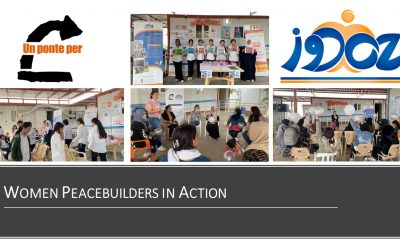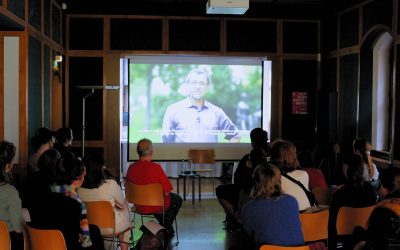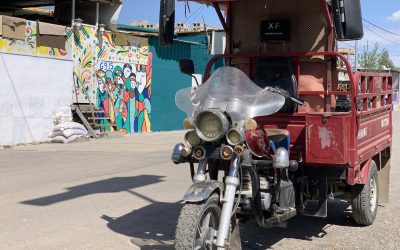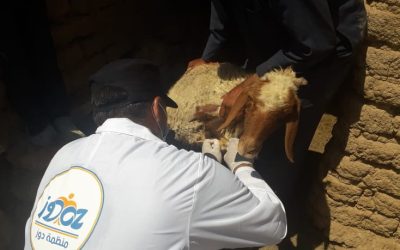Xêlata DOZ Project – A Dance Journey Through Kurdistan
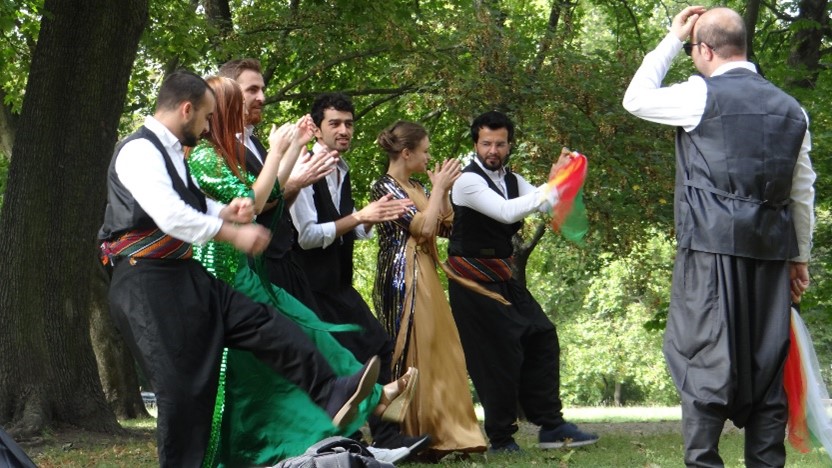
The Project was funded by The City of Leipzig.
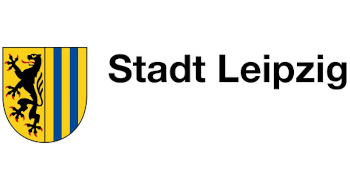
General Information About The Project
| Donor | Stadt Leipzig |
| Period | 01.05.2019 – 31.12.2019 |
| Number of Participants | 4 to 12 (trainings), over 150 (performances) |
| Number of Events | 34 Events |
| Coordination and Social Media | Jamie Bowcock, Anne-Sophie Krys |
| Dance Trainers | Hanieh Babaei, Azad Sleman |
| Photographer and Film Maker | Jamie Bowcock, May Dugast, Julia Quaas, Torsten Siedler, Andie Rutzen |
| Design | Aditi Singh |
| Cooperation | – Das Soziokulturelle Zentrum, – Die VILLA Leipzig, – Pöge Haus e.V. – Leipziger Syrienhilfe e.V. , – Gutshof Stötteritz e.V. – TanzhausFolk e.V. |
Short Description About The Project
The project developed a new dialogue-oriented format to prevent anti-human attitudes and promote tolerance. By learning traditional Kurdish dances with the corresponding music, an intercultural exchange within and outside the Kurdish community in Leipzig was made possible.
The people with refugee experience, who arrived in Germany and thus also in Leipzig, bring their knowledge, their faith and their culture into our society. DOZ e.V. sees itself as a bridge builder and mediator for international understanding. The project Xêlata DOZ was, among other things, about people without migration background to get to know the Kurdish culture and to develop curiosity, as well as intercultural understanding.
Xêlata DOZ means “DOZ’s Gift of Dancing” in Kurdish-Kurmanji. According to this, the dance should strengthen the will for a peaceful coexistence. The folk music and folk dances are part of the Kurdish culture and at the same time very diverse in their form as well as their contents, rhythms, instruments and traditional costumes. We wanted to experience this diversity together through a dancing journey. This is done in the company of musicians from the different regions of Kurdistan.
The project was planned to run from May to December 2019 and was to proceed in seven phases:
- Phase 1: Acquisition of participants (May 2019).)
- Phase 2: Building the group dynamics (June 2019).
- Phase 3: Dances and music from Turkey (June-July 2019).
- Phase 4: Dances and music from Iran (September-October 2019)
- Phase 5: Dances and music from Syria (November-December 2019)
- Phase 6: Closing ceremony (December 2019)
- Phase 7: Evaluation and follow-up (December 2019)
Progress of the Project Xêlata DOZ
After the project was approved by the city of Leipzig on April 5, the distribution of work could take place. Since the coordinator of the pre-project (Kashkol – Leipzig) was otherwise involved due to lack of time capacities, she could not take full responsibility for Ralata DOZ – Xêlata DOZ. As a solution, the work on the project was divided between her and an intern. After the division of work, the organization of the project began and the first steps were taken. This included designing promotional material for the information event and establishing contact with the potential dance teacher for the first phase of the project.
The original plan was to have four phases of the project, each representing a country with Kurdish culture. However, due to difficulties in finding teachers/experts from Iraq/Turkey, we decided to limit the project to only two phases. The trainings took place mainly on Fridays from 17:00 to 19:00 in the VILLA Leipzig (Lessingstraße). Deviating from this, we also trained at times in the Pögehaus Leipzig or danced outside in the park when the weather was nice.
The first phase lasted from 10.05.19 to 28.06.19. Within this phase the participants learned dances and their cultural meaning from the Kurdish regions of Iran and Iraq. The highlight of this was a performance by the dance group at the Stötteritz district festival on 15.06.19. An additionally planned performance at the Multicultural Summer Festival on 30.06.19 in Leipzig unfortunately had to be cancelled due to illness of many group members and unfavorable weather conditions.
After a short break, the second phase began on 07/16/19. This unit included, in addition to the dances, thematically linked lectures from the Kurdish regions of Syria. During this phase, two performances took place in September: The first at the Tanzfest International on 14.09.19 organized by Mühlstraße e.V. and the second as part of the Intercultural Weeks on 15.19.19 called Çîrokên Dîlanan (Dance Stories).
Finally, the closing ceremony of the project took place on 29.11.19 at UT Connewitz. The event was organized in cooperation with the Kurdish Film Days 2019, another project of DOZ e.V.. In this context, the evening included dance performances and live concerts by Kurdish musicians, as well as a film screening. The concerts consisted of traditional live music, a davul (big drum) as well as a zirnê (flute). The typical Kurdish music performance delighted the audience. The dancers were dressed in traditional costumes during the performances, which were specially ordered from Iran. In total, more than 150 people of different origins and ages came together to spend a common evening in a unique, intercultural environment.
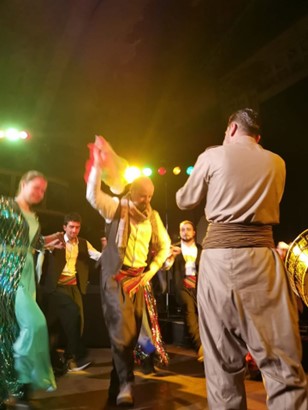
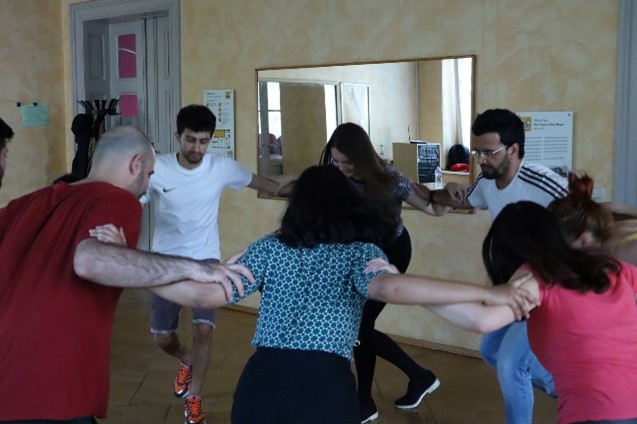
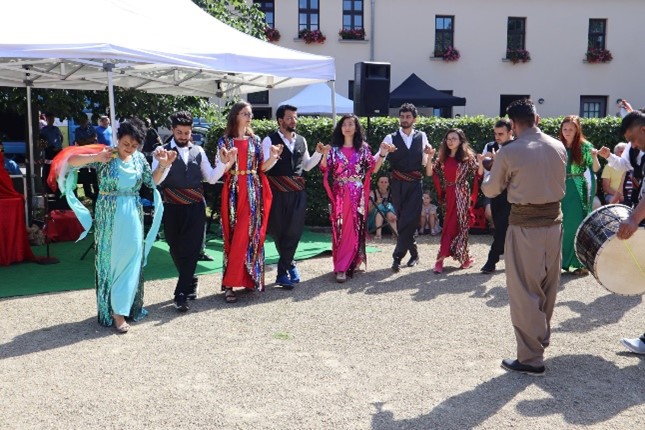
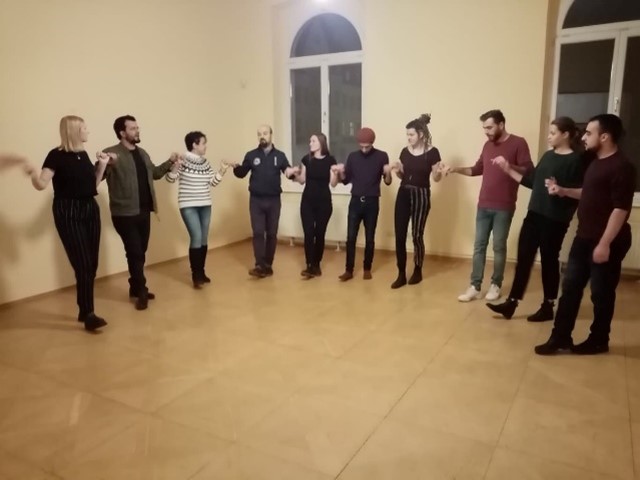

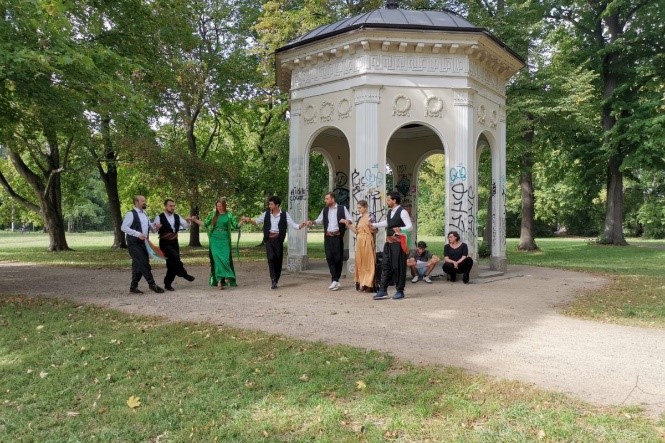
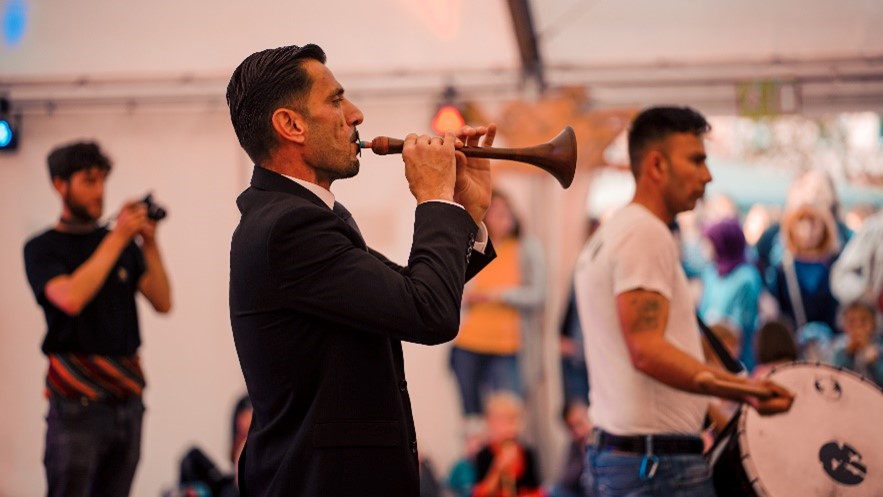
Activities Implemented Under This Project
Information Event
| Date and Time | 04.05.2019, 14:00-17:00 |
| Place | Ziegenledersaal, Uni Leipzig |
| Participants | 10 participants, from Syria, Iraq, Germany |
| Agenda | Presentation of the interested partiesExplanation of the project: A ‘Kurdish Dance Journey’ in the period from May to December in the framework of which Kurdish folk dances from Iran, Iraq, Turkey and Syria are learned – with musical accompaniment and cultural exchange.There were also refreshments for the participants |
Training Sessions – First Phase
| Date and Time | 10.05.19 – 28.06.19 Fridays 17:00-19:00 |
| Place | Die Villa Leipzig, Pöge Haus, Friedenspark |
| Participants | Dance Trainer (Hanieh Babaei), 5-10 dancers. The group consisted of 8 dancers: 4 males from Syria and 4 females from Germany, France, Kyrgyzstan. |
| Number os Sessions | 11 (9x Villa, 1xPöge Haus, 1xFriedenspark) |
| Agenda | Within each training session the following folk dances from Iran/Iraq were taught: Chapi I, Chapi II and Garyan. On 24.05 there was a lecture about the socio-cultural importance of the different dances. |
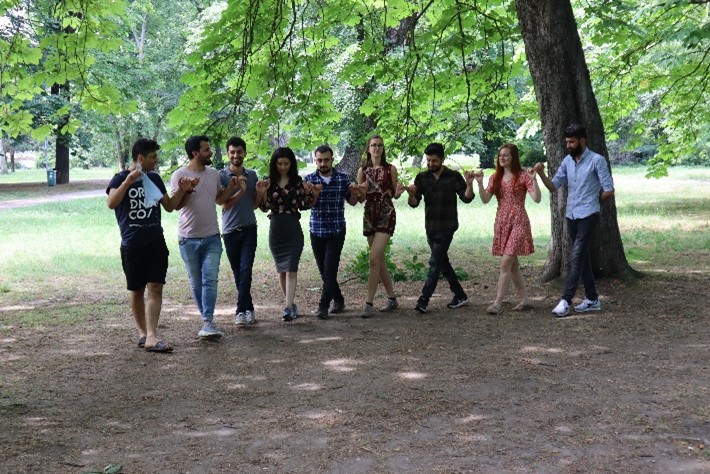
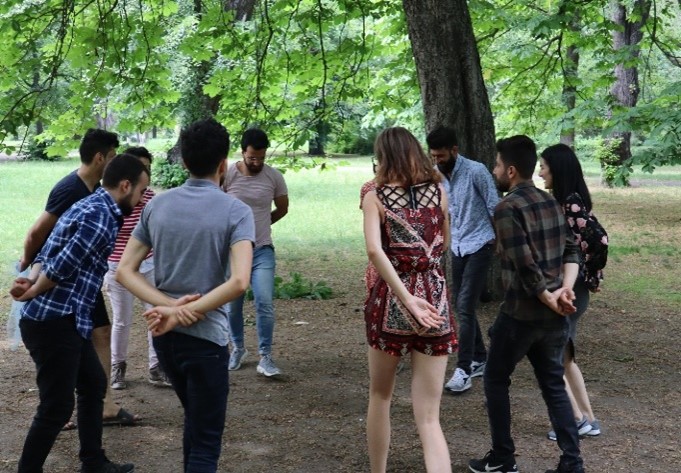
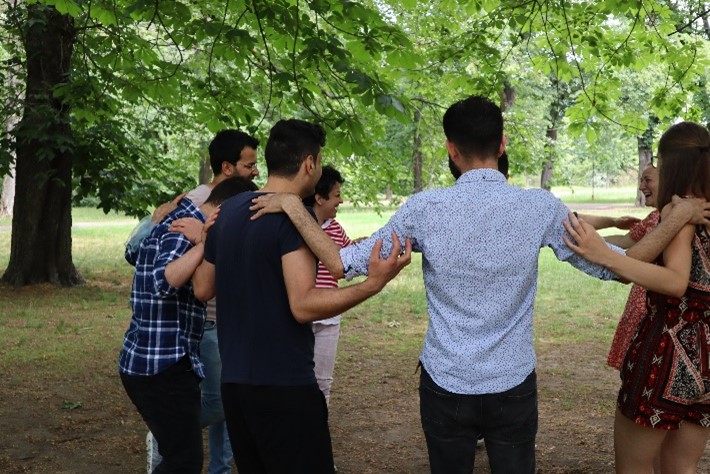
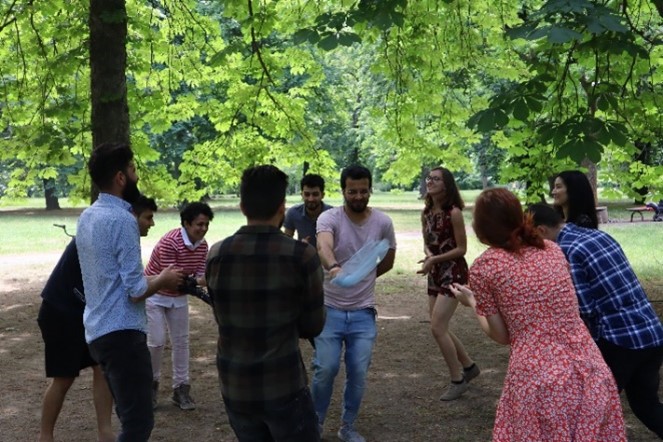
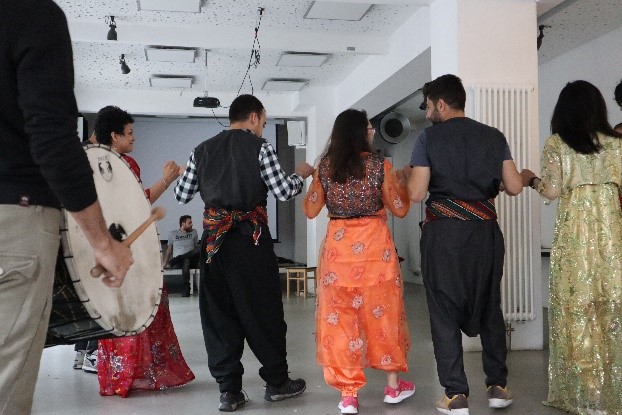
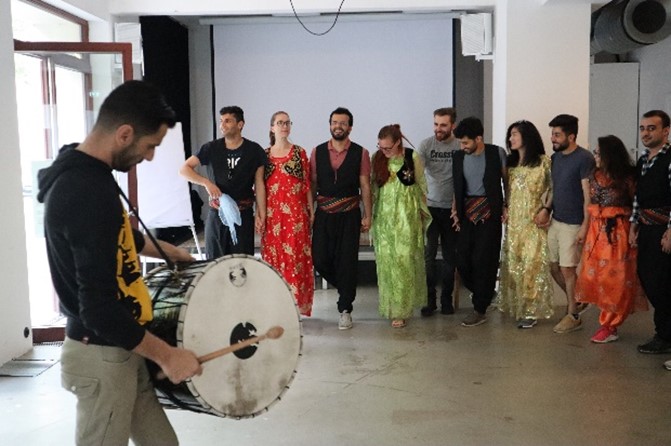
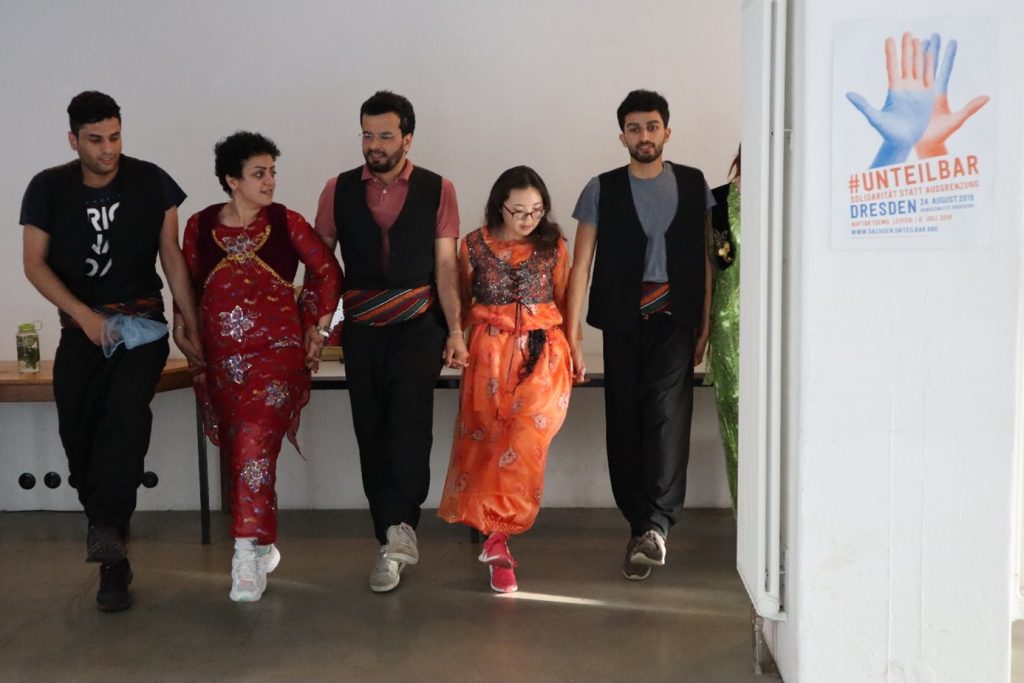
Performance: Stötteritz Summer District Festival
| Date and Time | 15.06.19, 16:00 |
| Ort | Gutshof Stötteritz, Leipzig |
| Participants | 10 Dancers |
| Dance trainer | Hanieh Babaei |
| Musicians | Davul / Zirnê players |
| Agenda | Our Xêlata DOZ dance group entered the stage in traditional Kurdish-Iranian costumes for the first time within the project. This happened in the context of the summer festival at Gutshof Stötteritz. The opportunity arose because the operators of the Gutshof Stötteritz became aware of us after our last year’s graduation party and then contacted us directly. Together with the musicians who played Davul and Zîrne, we presented our learned dances from Kurdistan-Iran (Chapi I, Chapi II and Garyan) at 4 pm. At the end of our performance, the audience was invited to dance Chapi I together with us. |
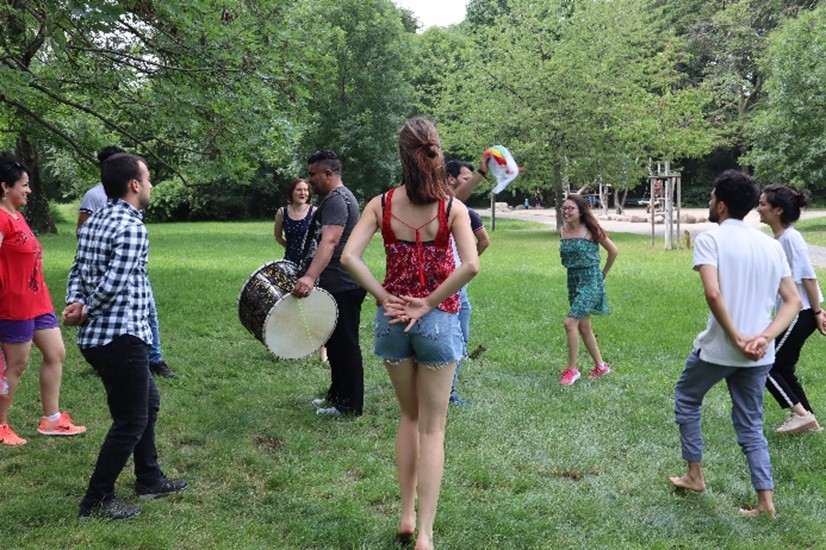
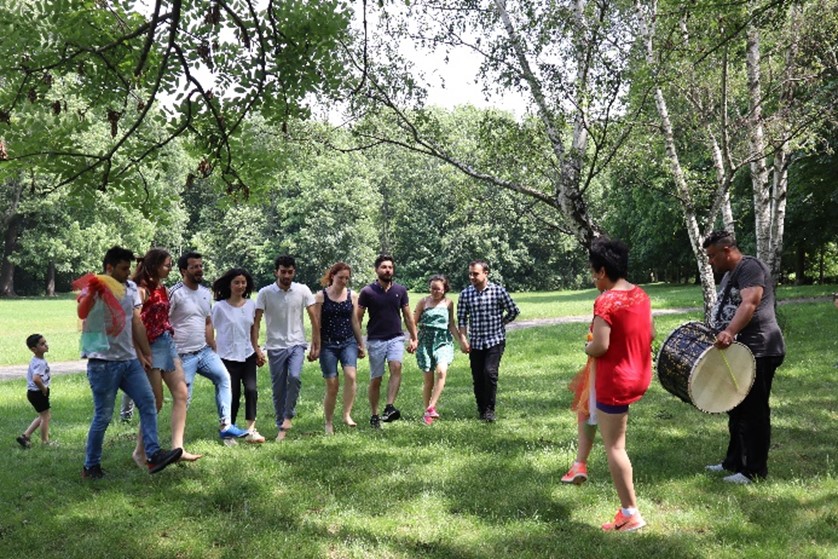
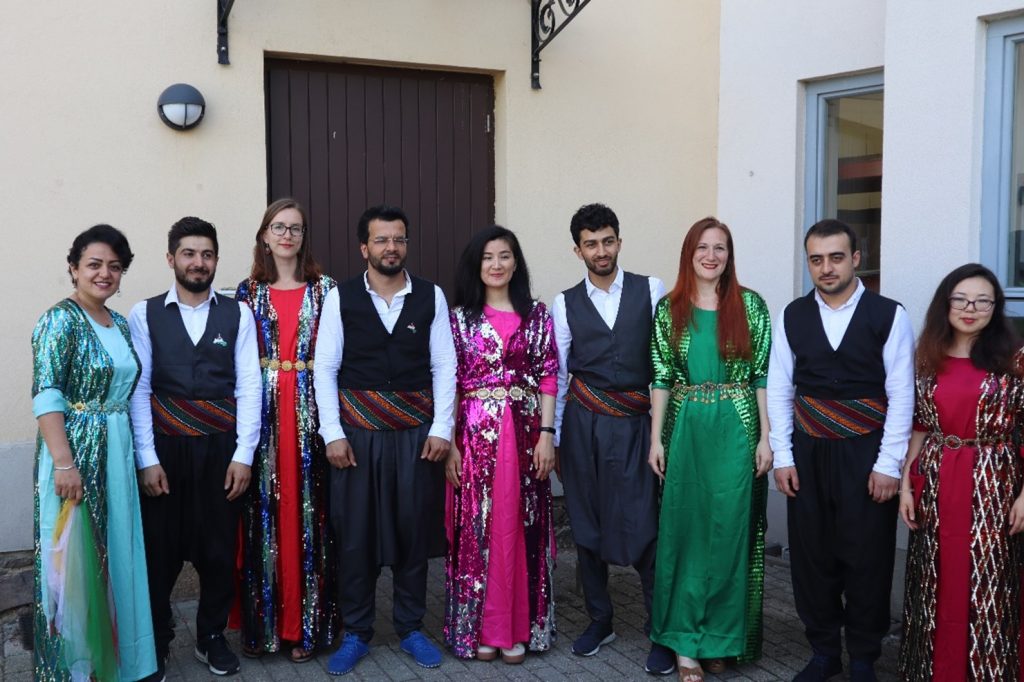
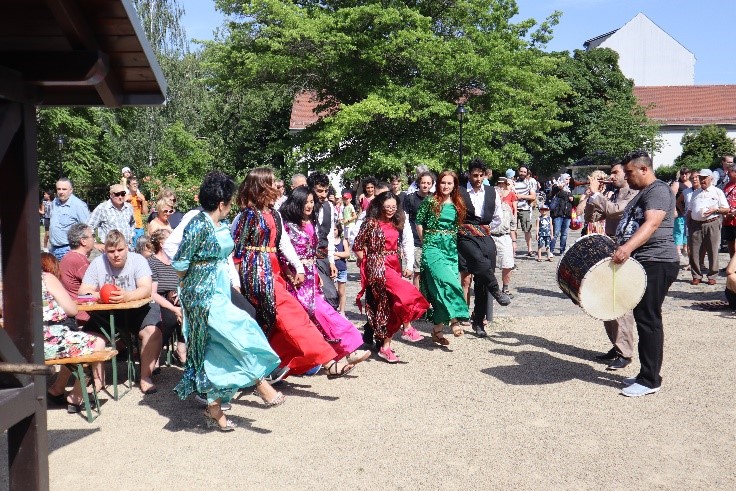
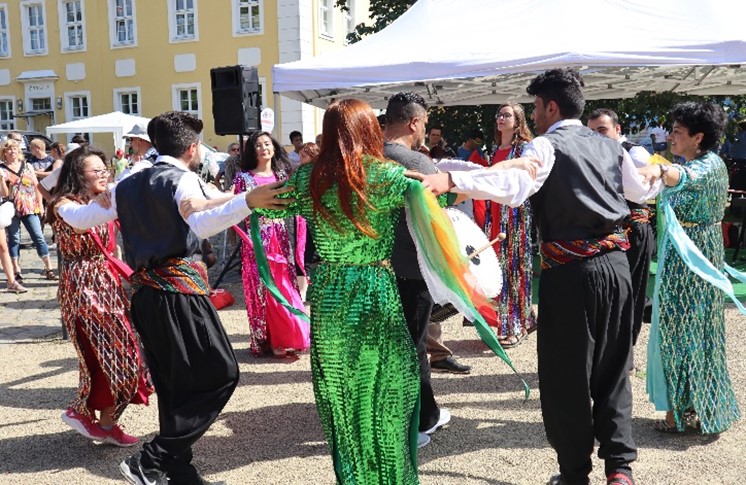
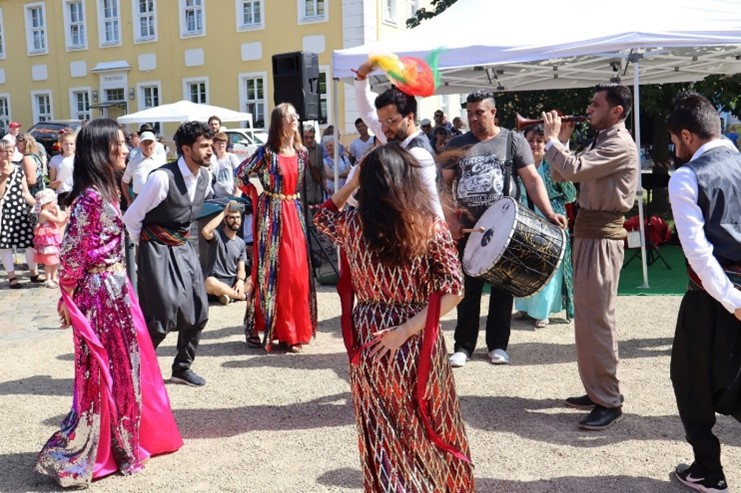
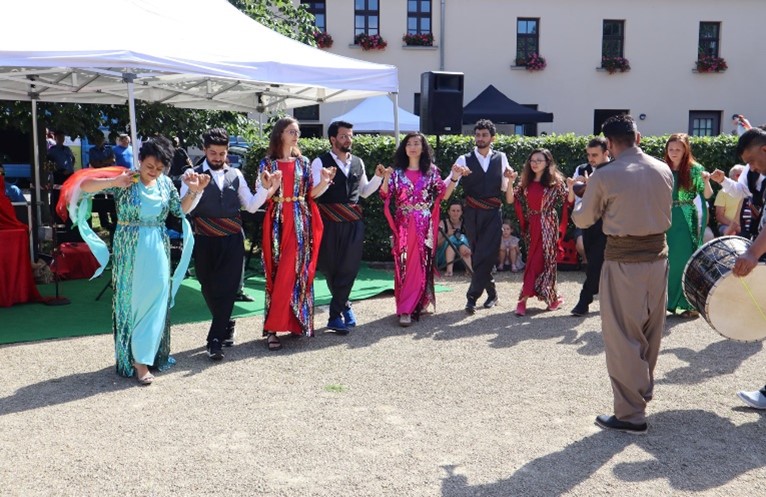
Training Sessions – Second Phase
| Date and Time | 16.07.19 – 29.11.19 /Fridays 17:00-19:00 |
| Place | Die Villa Leipzig, Clara-Zetkin Park, Leipziger Syrienhilfe e.V. |
| Dance Trainer | Azad Sleman |
| Participants | 5-10 dancers. In this unit we kept the same core group of boys from Syria. However, the number of female dancers changed, which was mainly composed of German and Russian participants. |
| Agenda | During this unit, the following folk dances from the Kurdish regions of Syria (Rojava) were learned: Dû gavi, Hallay, Cherani and Bagiyê. The Kurdish dance teacher also provided a lot of information about the cultural significance of the dances from his home region. Even though the number of participants was not optimally high at the beginning of this phase, it increased in the course of time. This became especially apparent after establishing contact with another dance group from Leipzig, which danced Arabic Dabke. |
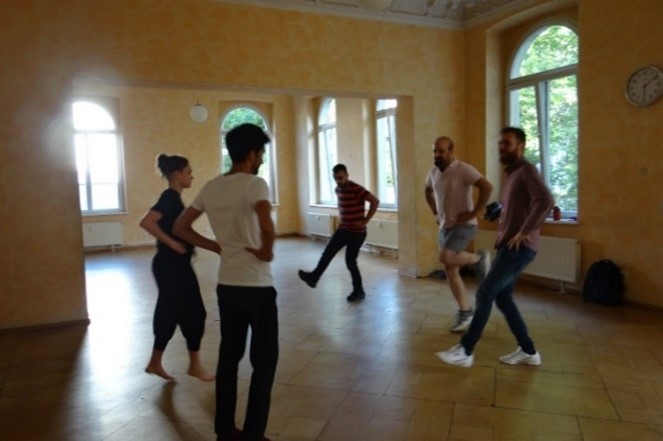
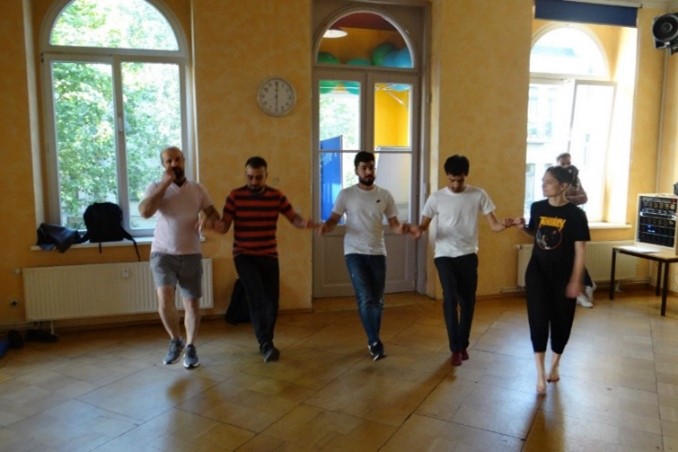
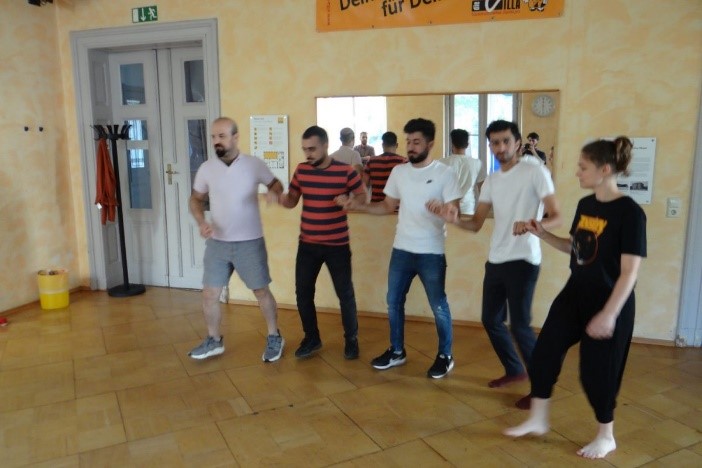
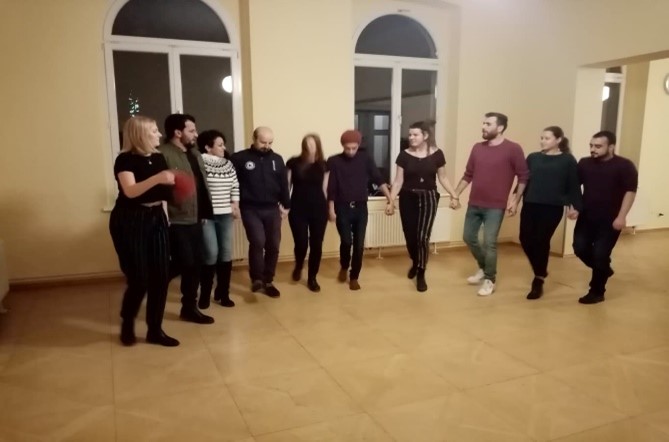
Performance: International Dance Festival (TanzhausFolk e.V and Mühlstraße 14 e.V)
| Date and Time | 14.09.19, 17:00 |
| Place | Lene-Voigt Park |
| Participants | Dance Trainer (Azad Sleman), 7 Dancers, Photographer, Musicians (Davul / Zirnê players) |
| Agenda | On September 14, a successful performance took place at the Tanzfest International 2019. This was organized by the association Mühlstraße 14 and TanzhausFolk e.V. The dancers and the accompanying davul and zîrne players met in advance in the Friedenspark to warm up and get into the dancing mood. At 5 p.m., the dance group went to the nearby Lene Voigt Park, where the Dance Festival International 2019 was held. Led by dance instructor Azad, four different dances were presented: Dû gavi, Cherani, Hallay and Bagiyê. |
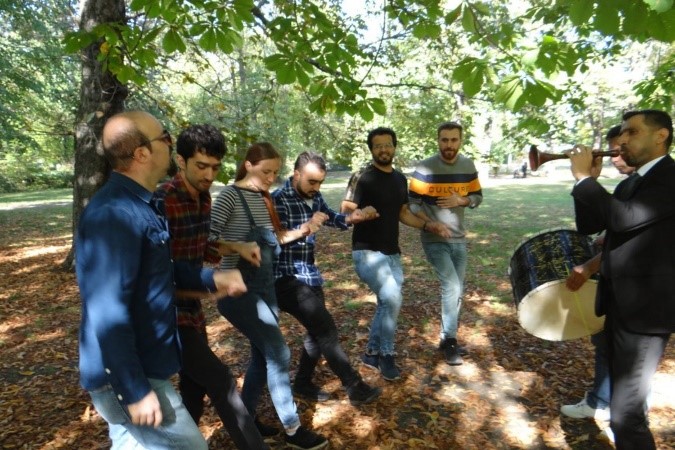
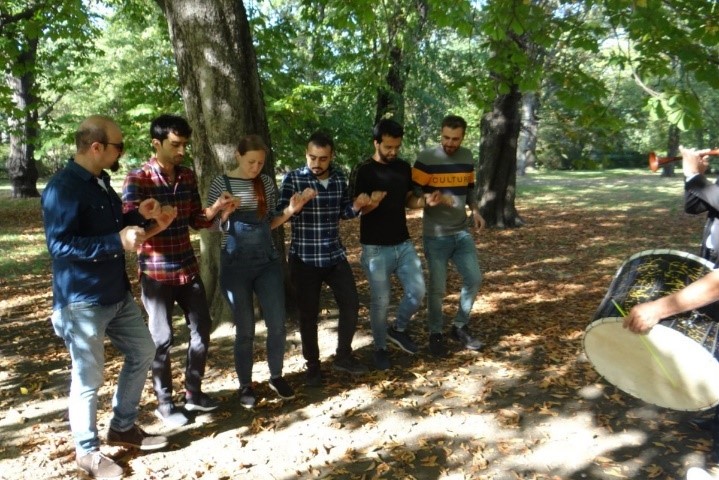
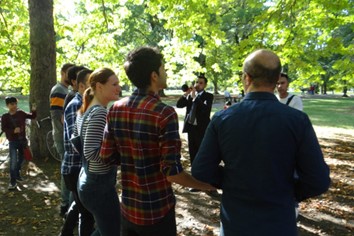
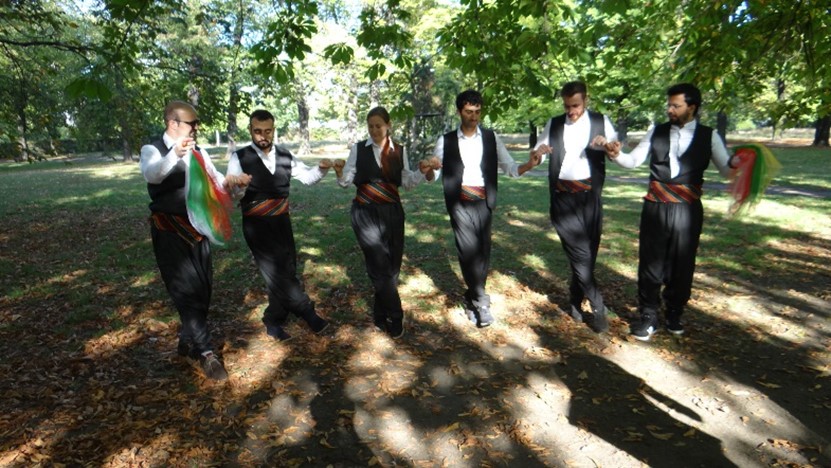
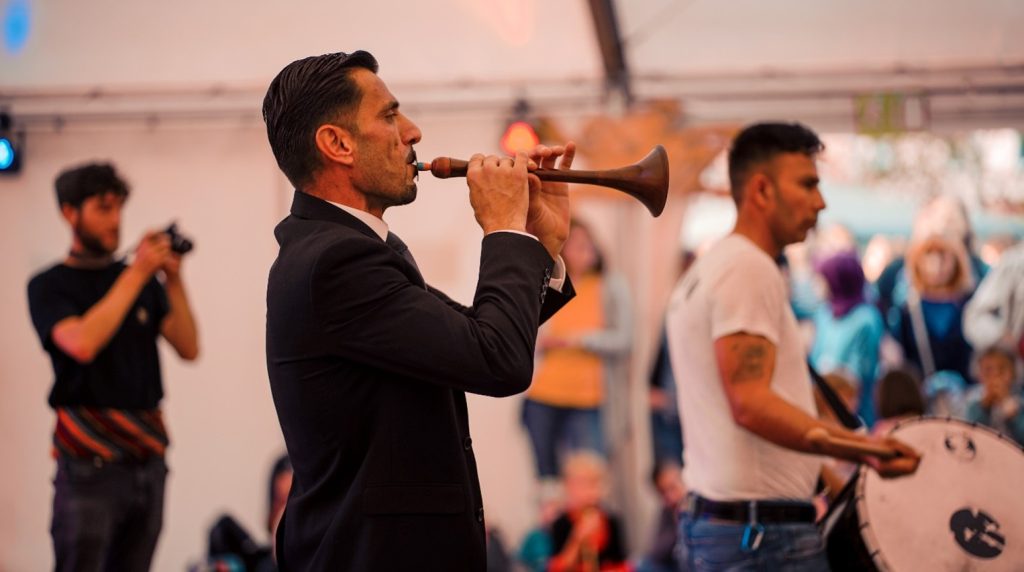
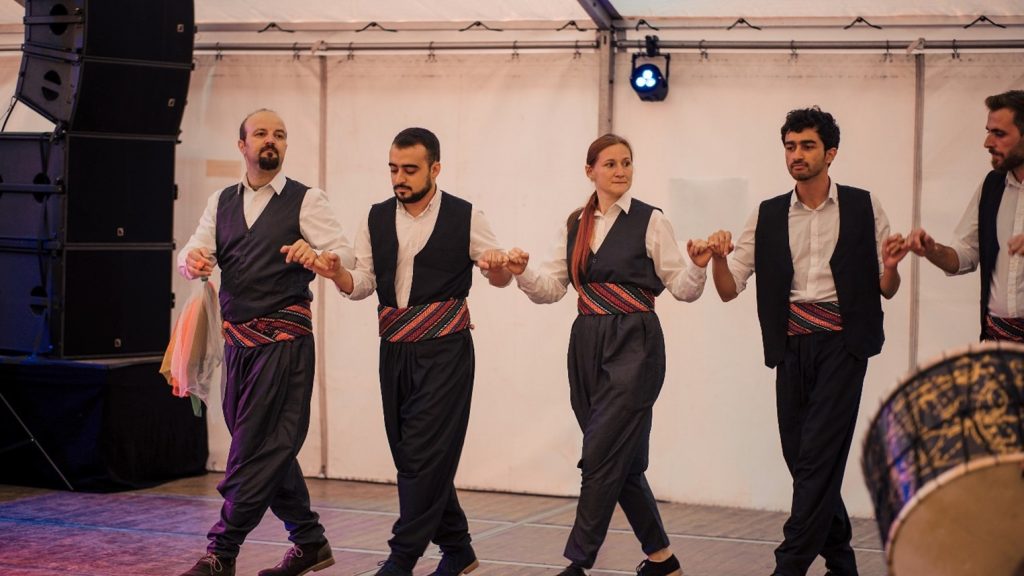
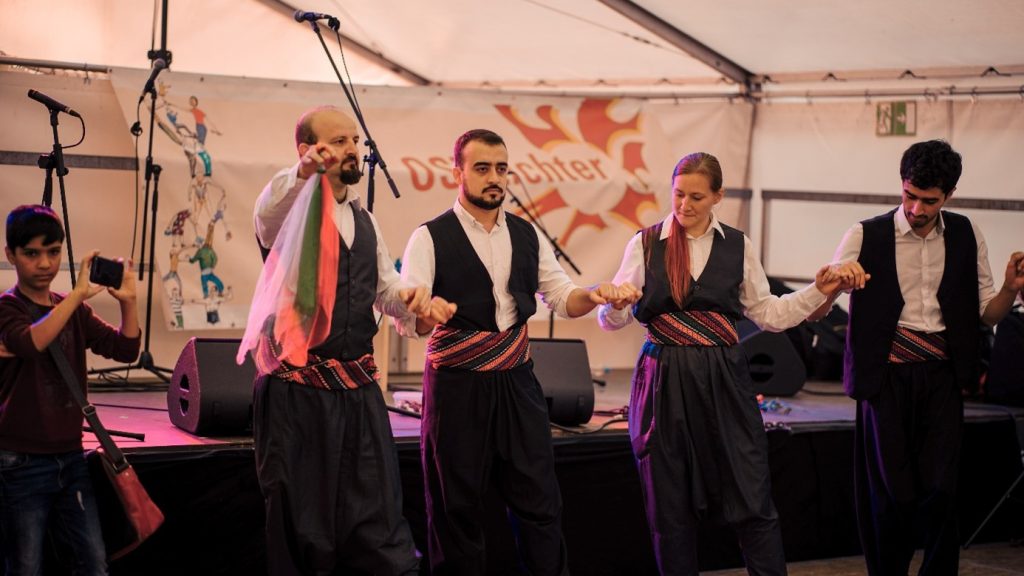
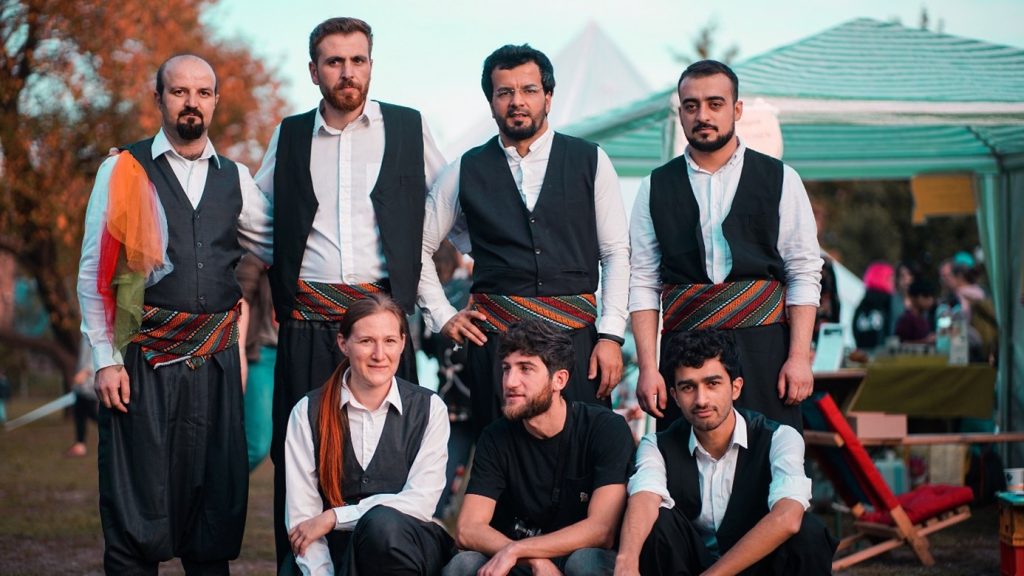
Perfromance: Çîrokên Dîlanan – Dance Stories
| Date and Time | 15.09.19, 14:00-17:00 |
| Place | Clara-Zetkin Park |
| Participants | Dance trainer (Azad Sleman), Narrator (Jacqueline Shehab), 7 dancers, musicians (Davul / Zirnê players) |
| Agenda | As part of the Leipzig Intercultural Weeks, we developed a new format integrating traditional Kurdish dances into a narrative, “Çîrokên Dîlanan – Dance Stories”. The story, co-written by the Kurdish participants with the help of Andrea Rutzen, was about love, music, and culture in the different Kurdish regions. The show was performed twice in Clara Zetkin Park on Sunday, September 15 during the afternoon. The story of Jacqueline Shehab was told. The dancers of the group Xêlata performed traditional Kurdish folk dances. In the relaxed atmosphere in front of Gerhard’s Pavilion, we enjoyed a picnic before the first performance, and then presented our dance stories to the audience. The second showplace of the day was provided by the Sachsenbrücke. |
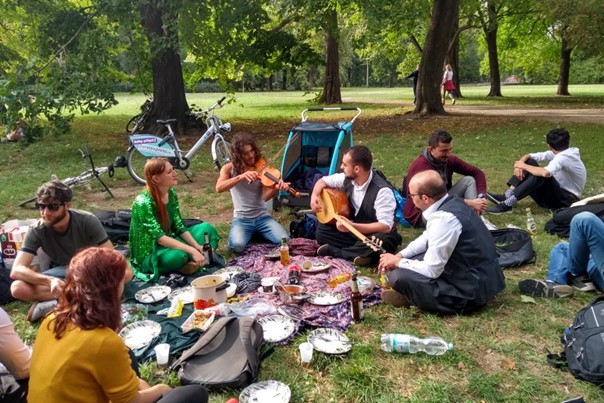
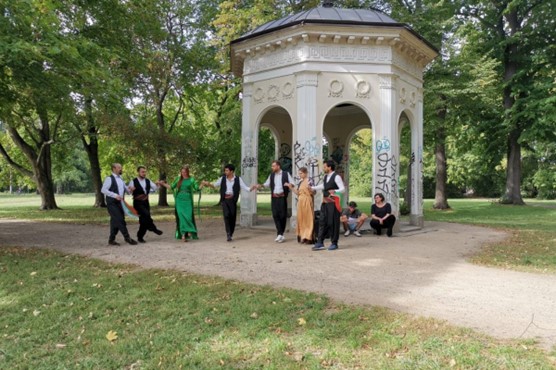
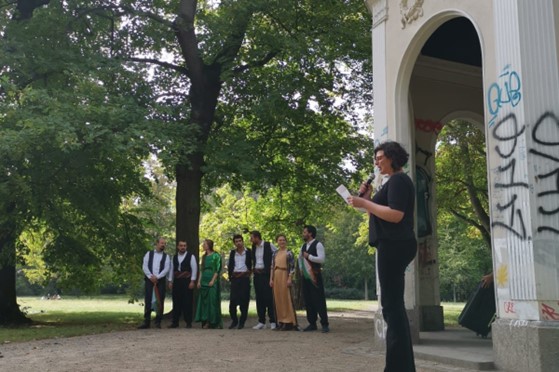
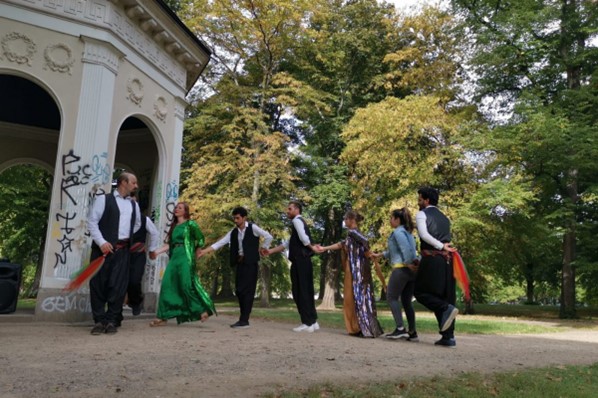
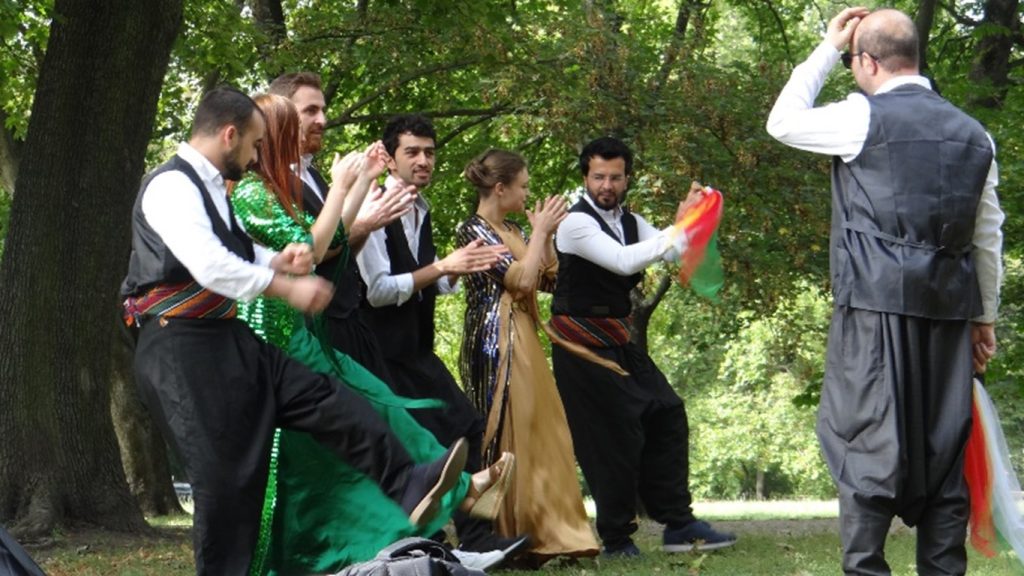
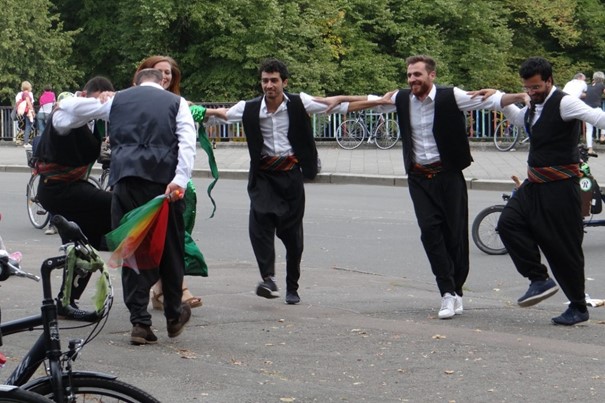
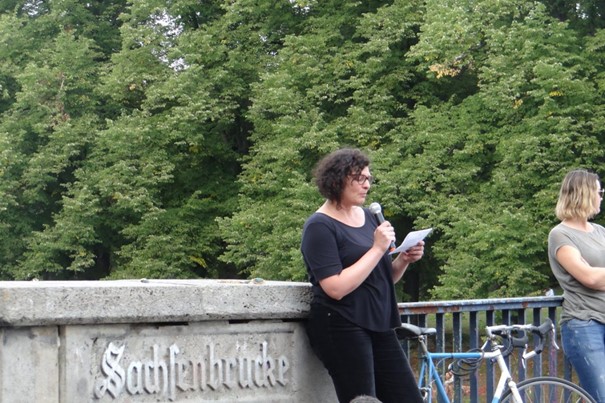
Closing Ceremonyr: Xêlata DOZ Soliparty
| Date and Time | 29.11.19, 18:30-03:00 |
| Place | UT Connewitz |
| Participants | Dance coach (Azad Sleman), 8 dancers, photographers, musicians: Davul / Zirnê players, Kurd Band, Amjad Bakir, moderator (Abdulaziz Ramadan), coordinators (Jamie Bowcock and Anne-Sophie Krys), DJs (Andie Rutzen). |
| Agenda | Together with our Kurdish Film Days team we organized the evening together with musicians and dancers. At 18:30 the evening began with the screening of the film ‘Saz – The Key of Trust’ as part of the Kurdish Film Days. After that there was the first musical performance, a Saz concert by the musician Amjad Bakeer. This was followed by the performance of traditional dances from the Kurdish regions of Iran, Iraq and Turkey and Syria. Our Xêlata DOZ dance group showed the audience what they had practiced in different Kurdish dance styles. So they presented in the first performance the dances Garian, Chapi I and II and in the following performances Dû gavi, Cherani, Hallay and Bagiyê. The dance performances were interspersed with a live concert by the Kurd Band. As a highlight of the evening, a Kurdish dance from the regions of Syria was rehearsed together with the audience and later danced together in a large group. During the evening Amaar from Bistro Syria provided us with food. The finale was the DJane set by DJane Workalot, the Oriental Disco! Together, all of the approximately 150 participants were able to shake a leg and let the successful evening come to an end. |
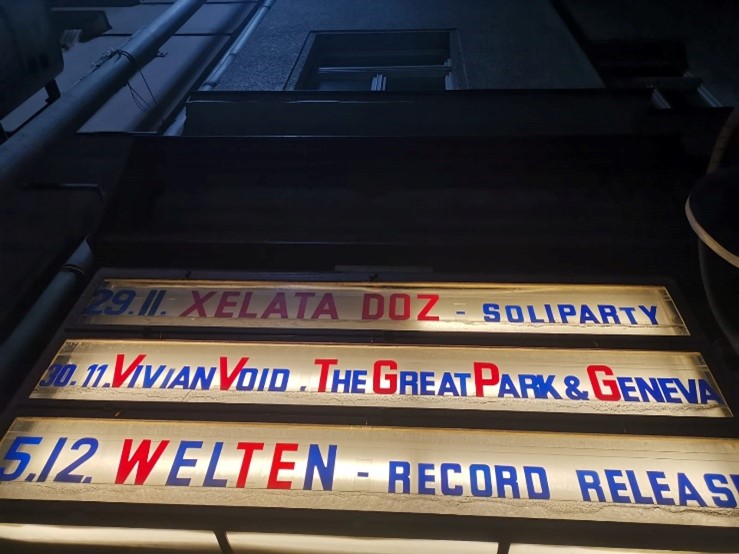
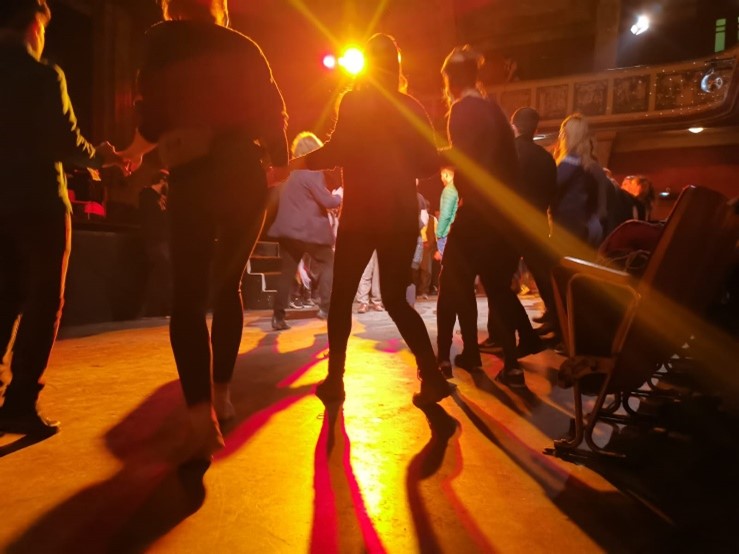
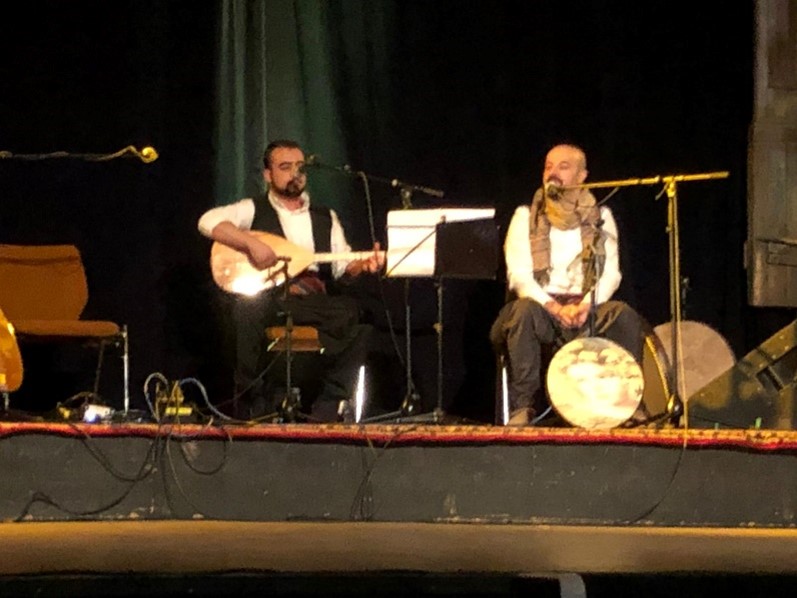
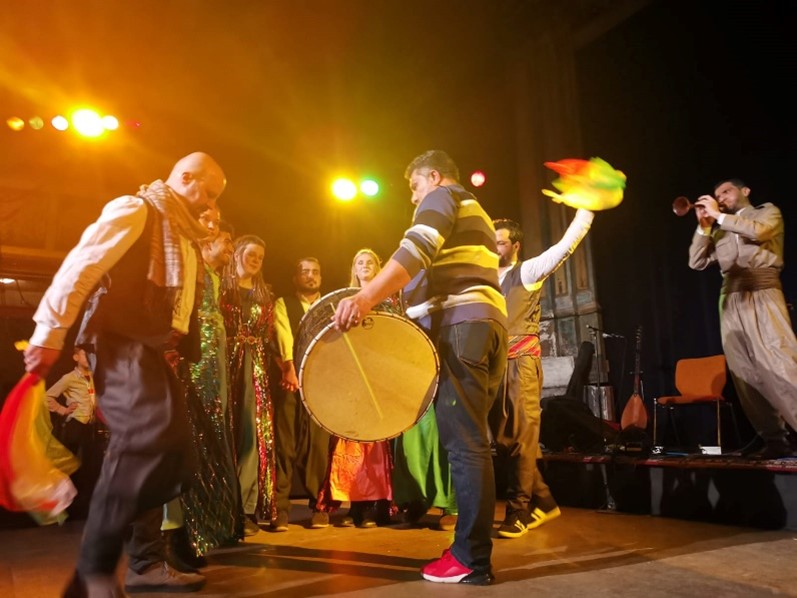
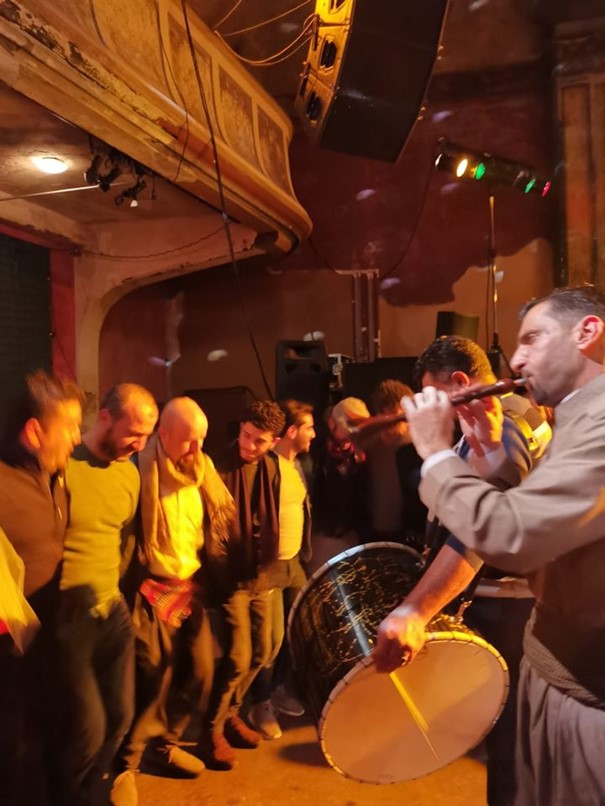
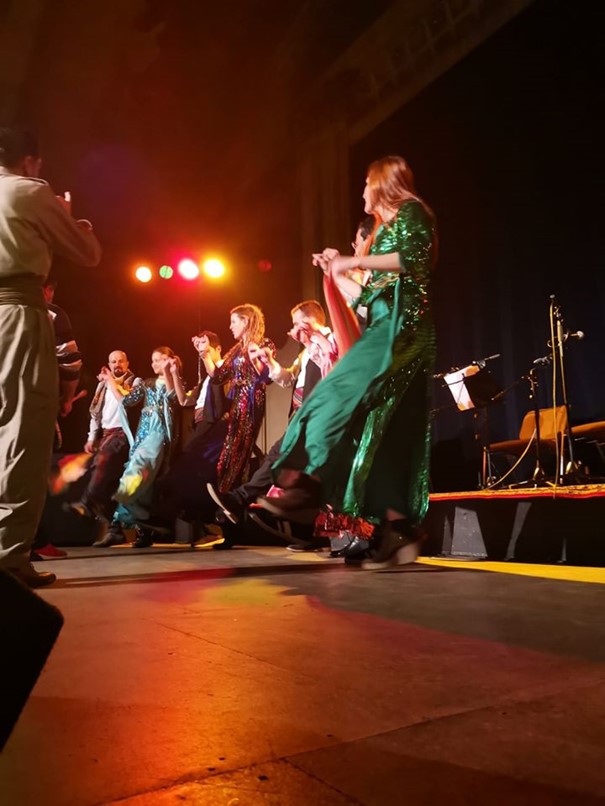
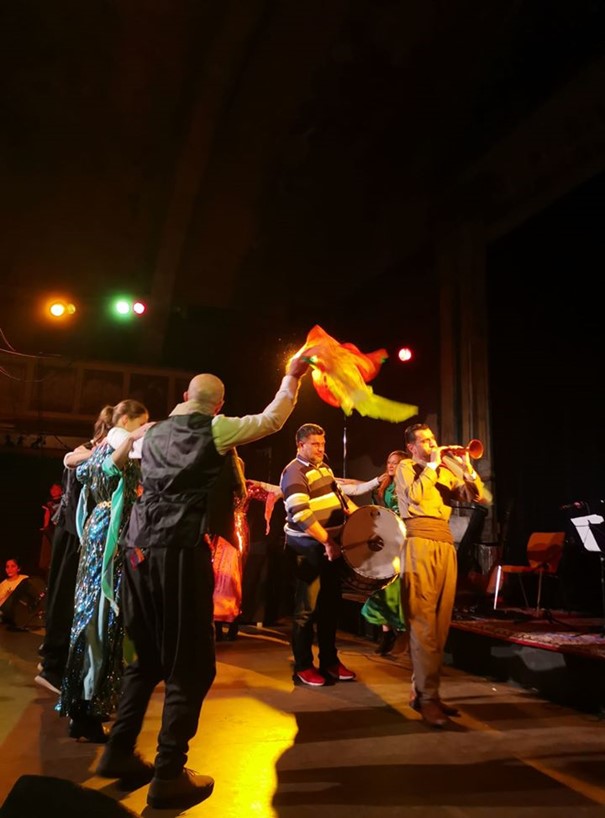
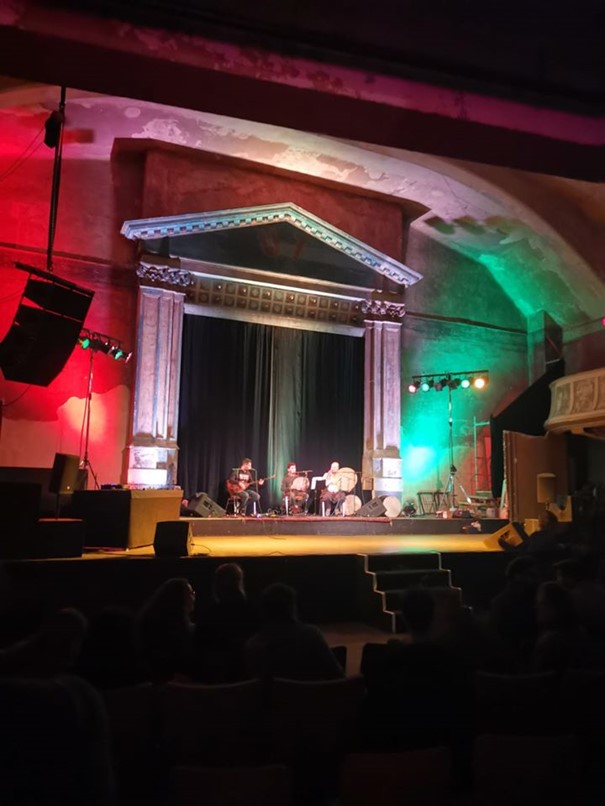
The Media Work
The media work had two focal points: On the one hand, advertising for and reporting on the project. On the other hand, strengthening the social media skills of the project coordinators. For the first time within this project, the Leipzig designer Aditi Singh was involved in the creation of advertising material.
Tasks Done
– Management of a Whatsapp group with the participants
– Management of Xêlata events (trainings and performances) on Facebook.
– Realization of a countdown video action on Facebook in the run-up to the graduation ceremony.
– Creation of photo and video recordings during trainings and performances.
– 2 flyers were developed: One for the info session/acquisition of participants, another for the graduation ceremony.
– 3 posters were created: One for the event “Dance Stories“ and two for the closing ceremony.
– Articles have been posted on our website.
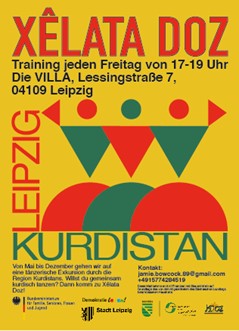
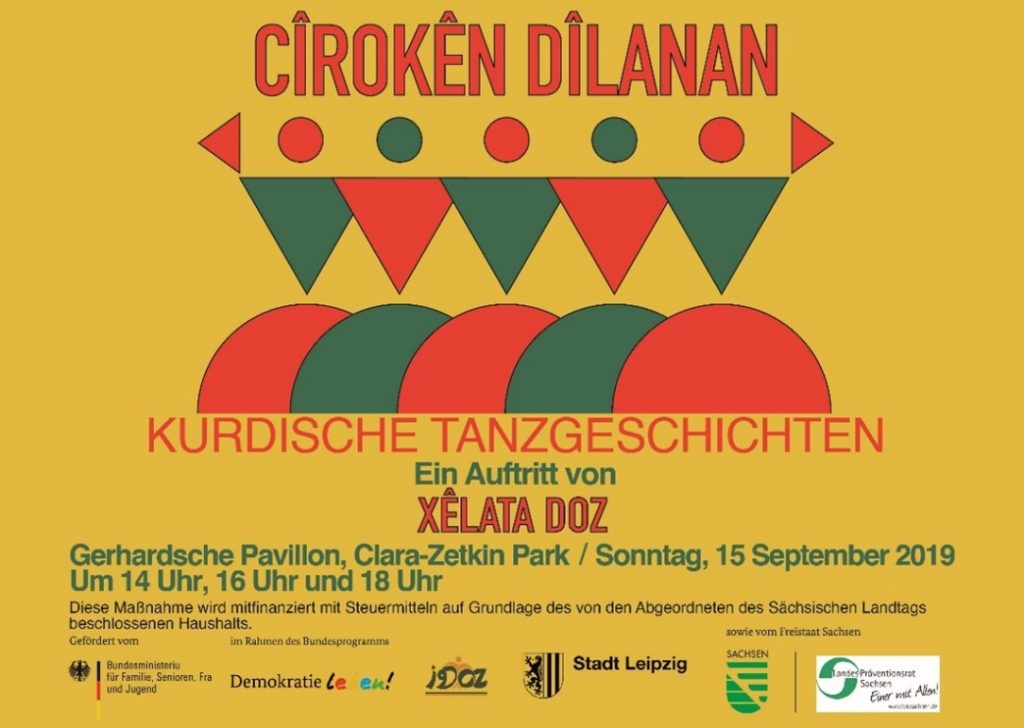
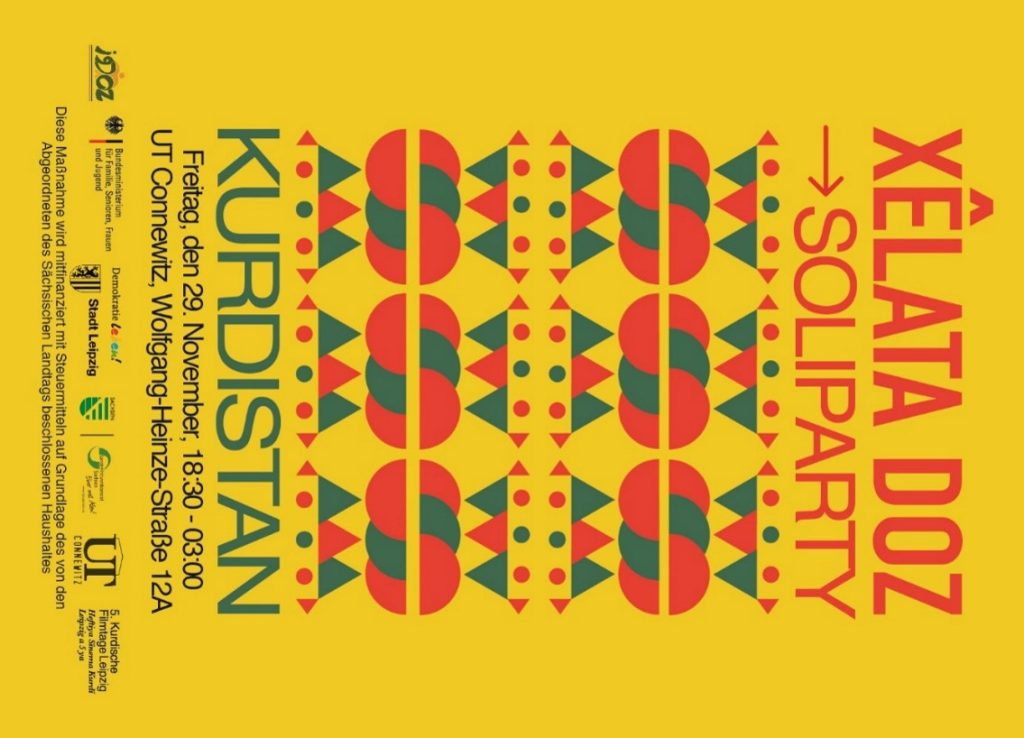
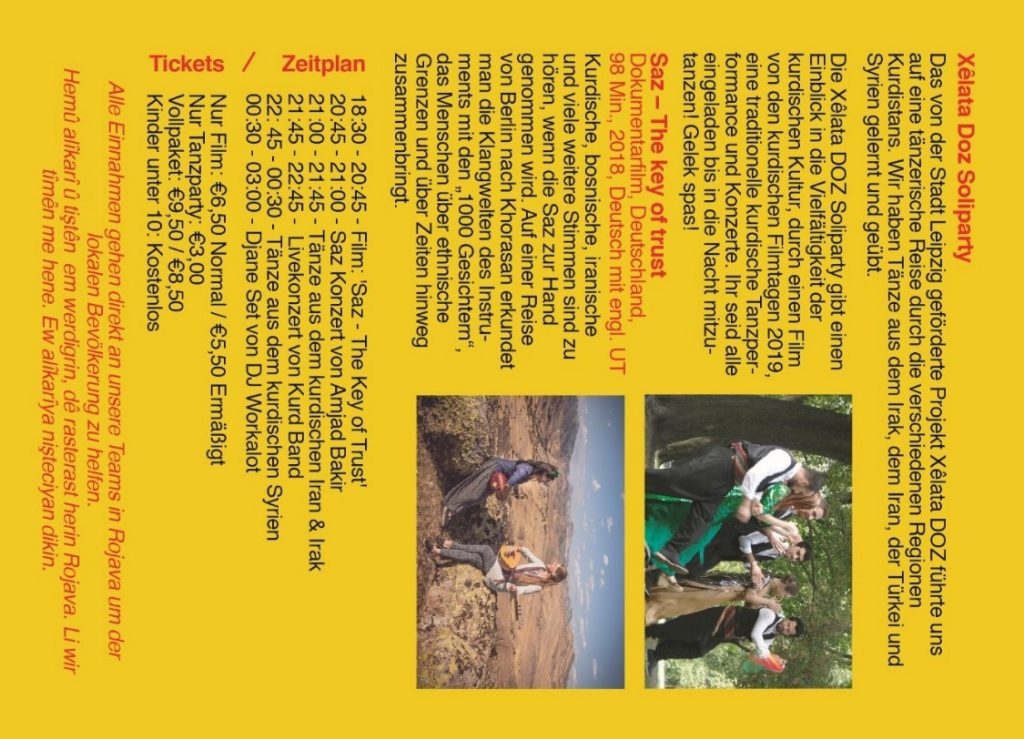
Evaluation of The Project
Indicator 1: Regular participation in the entire project
At the information event on 04.05.2019 nine participants took part, almost all of them already had experience from the preliminary project. The interested parties present there later formed our core group for the first project phase. At almost every following training there was an average of 7 participants. At the first performance in Stötteritz 10 people took part, this meant an increase of 3 new participants for our group.
The second phase was unfortunately characterized by a lower number of participants of 4-7 dancers. This was possibly due to the fact that: 1. people saw the first performance as the ‘end of the project’ 2. many people were on vacation in the summer and therefore not in Leipzig 3. the break of 4 weeks between phase 1 and 2 was too long. At the following Tanzfest International finally 6 dancers took part. It consisted of the core group of boys from Syria and a French woman. At the performance ‘Dance Stories’ the next day, 7 dancers were present. However, the group generally consisted mainly of DOZ e.V. employees and their colleagues.
The low number of participants persisted in the following weeks. October, however, meant an upswing in this respect. Our group received growth through contact and exchange with the ‘Dabkeh’ dance group from Leipzig. As a result, our trainings were usually attended by 8 to 11 participants. Finally, 8 dancers performed on the stage of the closing ceremony, as some spontaneously dropped out due to illness.
Indicator 2: Success of the Closing Ceremony
On Friday, November 29, 2019, the Xêlata DOZ Soliparty took place at UT Connewitz.
With lots of music, dance and song, Kurdish culture was celebrated together. Together with our Kurdish Film Days team, we organized the evening together with musicians and dancers.
At 18:30 the evening started with the screening of the film ‘Saz – The Key of Trust’ as part of the Kurdish Film Days. About 40 spectators came for this. After that there was the first music performance, a Saz concert by the musician Amjad Bakir.
Matching the musical mood followed the demonstration of traditional dances from the Kurdish regions of Iran, Iraq, Turkey and Syria. Our Xêlata DOZ dance group showed the audience impressively what they had practiced in the past 6 months with their teachers Hanieh and Azad in different dance styles. So they presented in the first performance the dances Garian, Chapi I and II and in the following performances Dû gavi, Cherani, Hallay and Bagiyê.
The dance performances were interspersed with a live concert by the Kurd Band. As a highlight of the evening, a Kurdish dance from the regions of Syria was rehearsed together with the audience and later danced together in a large group. During the evening Amaar from Bisto Syria provided us with delicious delicacies.
The crowning finale was the DJ set by DJane Workalot, the Oriental Disco! Together, all of the approximately 150 participants were able to shake a leg and let the successful evening end in a great and happy mood.
It was a successful and unforgettable evening.
Indicator 3: Participant satisfaction questionnaire
We created a questionnaire and forwarded it to our participants. In December 2019, project participants answered the survey. All of them responded positively to the first question, “Did the project bring you closer to Kurdish culture?”, which demonstrated for us a very positive sign of the project’s success.
Here are the other answers.
| 2. to what extent do you feel you have made a dance development over the duration of the project? |
| Of course sure |
| A lot |
| Very Good |
| Very Much Good |
| It was mega cool, really cool especially I felt like I’m still in my home country : ) |
| Although I hadn’t been at it long, I learned quickly and made good progress. |
| 3. how satisfied were you with the organization of the project (management, dance classes, dance facilities, performances)? | Very Satisfied | Satisfied | unsatisfied | Very unsatisfied |
| 1 | ||||
| 1 | ||||
| 1 | ||||
| 1 | ||||
| 1 | ||||
| 1 |
| 4. do you have any suggestions for improvement for a possible next project? |
| none |
| Find more suitable dates for training |
| Kurdish cultural week, varied between art and song and dance.and Kurdish cuisine also |
| no |
| Long live resistance our project kurdish dance |
| Better communication and clear structures |
| 5. do you want to continue dancing? |
| yes |
| yes |
| yes |
| yes |
| yes |
| yes |
Lessons Learned from The Project
a) Challenges in The Project
– Obstacles in acquiring musicians in the field of Kurdish traditional music. A long-term involvement of the musicians for the trainings was difficult to realize, since only the interest in the participation in performances existed from this side.
– A lack of commitment and at times poor communication led to unreliability on the part of the artists. For example, the musicians were constantly late for events.
– Lengthy process in acquiring dance teachers/experts from Kurdistan Turkey and Iraq.
– Difficulty in acquiring women of Kurdish origin. Increased participation of Kurdish men as well as women from non-Kurdish cultural backgrounds.
– In terms of finances, rescheduling/rededication was necessary. Internal difficulties arose from the management in terms of team organization in financial matters. As a result, our DOZ finance department organized a workshop on the subject. The experience resulted in the realization to pay more attention to finances in future projects as well as to involve them more directly from the beginning.
– The fact that we are a non-profit association and therefore depend on donations was not communicated clearly enough during the project and especially during the performances. In some cases, we did not even think about taking measures in this direction, such as the complete provision of a donation box at the events.
– The internal sensitivity between the participants of the dance group has sometimes led to problematic situations. It is important for the organizers to become more familiar with dealing as well as mediating between different personal views.
b) Positive Findings
– The trainings and the events were well attended and showed the interest in Kurdish culture.
– Expansion of our network of dancers, musicians, cultural associations and training venues.
– Increase of the internet presence for the project, especially on Facebook and the DOZ e.V. website, as well as generally much spread information of our events
– We were invited several times to perform at intercultural events: Buntega, Syrian Culture Days, Multicultural Summer Festival, Stötteritz District Festival. This means that our group has become better known in Leipzig circles.
– The communication with the city worked very well.
– Targeted reduction of prejudices through the equal image of women and men in Kurdish dance.
– All those who filled in the questionnaire (9 people) want to continue, which is a sign of the usefulness of the project.
– The cooperation organized by us between the project Ralata- DOZ – Xêlata DOZ. and the Kurdish Film Days was carried out this way for the first time this year and turned out to be a great success. Further cooperation in the future would be desirable and enriching for our structure.
– A good cooperation with our main training place, the Villa e.V., was established.
c) Improvement Opportunities
– More exchange with local Kurdish communities (pay more attention to cultural sensitivity).
– More exchange with other folklore dance groups
– Earlier involvement of the finance department
– In terms of internal financial procedures as well as in dealing with borrowed items, we could observe improvements in the team.
– In order to attract participants more easily, more PR should be done in advance.
– Pay more attention to punctuality at performances

